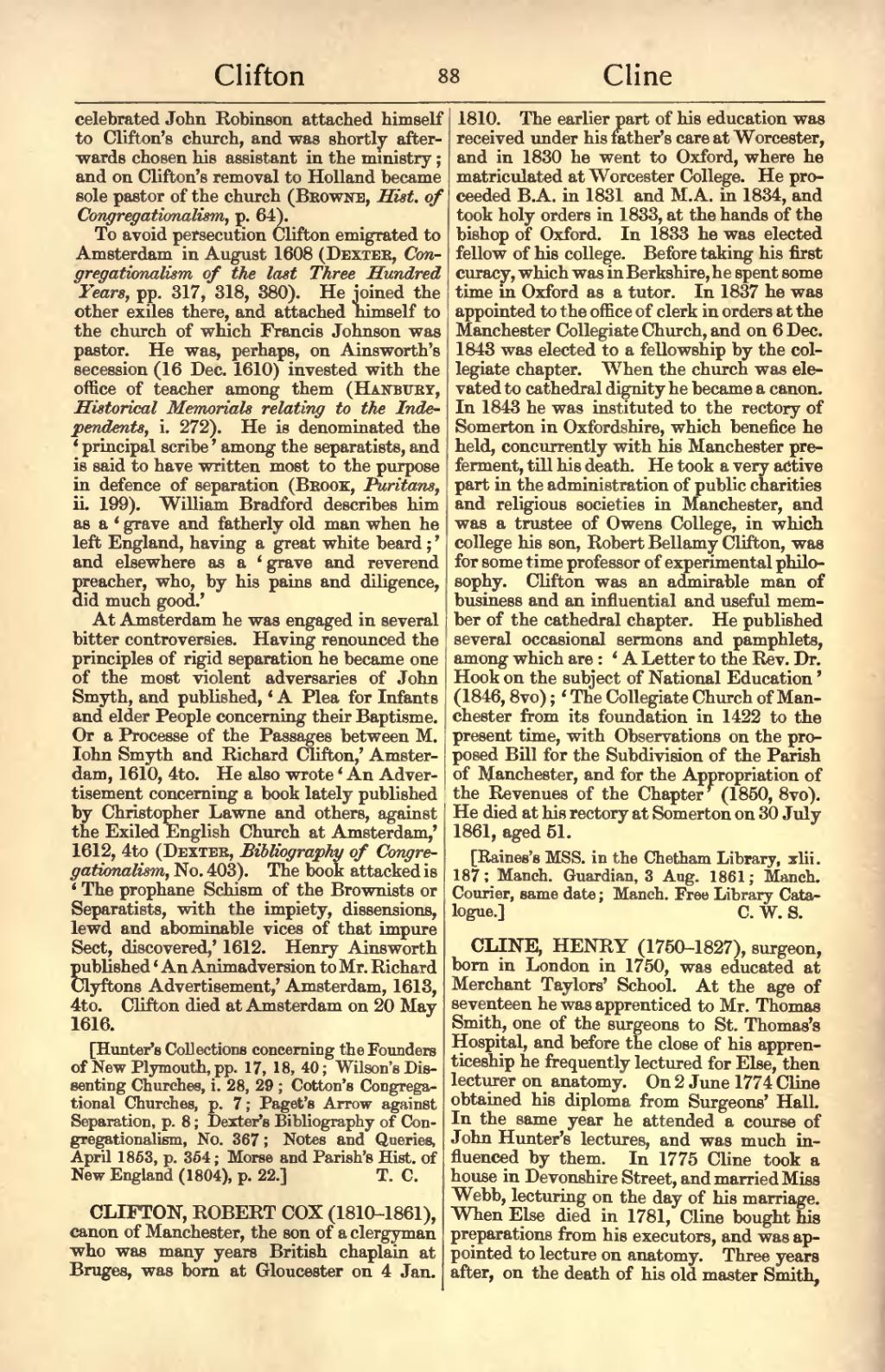celebrated John Robinson attached himself to Clifton's church, and was shortly afterwards chosen his assistant in the ministry; and on Clifton's removal to Holland became sole pastor of the church (Browne, Hist. of Congregationalism, p. 64).
To avoid persecution Clifton emigrated to Amsterdam in August 1608 (Dexter, Congregationalism of the last Three Hundred Years, pp. 317, 318, 380). He joined the other exiles there, and attached himself to the church of which Francis Johnson was pastor. He was, perhaps, on Ainsworth's secession (16 Dec. 1610) invested with the office of teacher among them (Hanbury, Historical Memorials relating to the Independents, i. 272). He is denominated the 'principal scribe' among the separatists, and is said to have written most to the purpose in defence of separation (Brook, Puritans, ii. 199). William Bradford describes him as a 'grave and fatherly old man when he left England, having a great white beard; ' and elsewhere as a 'grave and reverend preacher, who, by his pains and diligence, did much good.'
At Amsterdam he was engaged in several bitter controversies. Having renounced the principles of rigid separation he became one of the most violent adversaries of John Smyth, and published, 'A Plea for Infants and elder People concerning their Baptisme. Or a Processe of the Passages between M. Iohn Smyth and Richard Clifton,' Amsterdam, 1610, 4to. He also wrote 'An Advertisement concerning a book lately published by Christopher Lawne and others, against the Exiled English Church at Amsterdam,' 1612, 4to (Dexter, Bibliography of Congregationalism, No. 403). The book attacked is 'The prophane Schism of the Brownists or Separatists, with the impiety, dissensions, lewd and abominable vices of that impure Sect, discovered,' 1612. Henry Ainsworth published ' An Animadversion to Mr. Richard Clyftons Advertisement,' Amsterdam, 1613, 4to. Clifton died at Amsterdam on 20 May 1616.
[Hunter's Collections concerning the Founders of New Plymouth, pp. 17, 18, 40; Wilson's Dissenting Churches, i. 28, 29; Cotton's Congregational Churches, p. 7; Paget's Arrow against Separation, p. 8; Dexter' s Bibliography of Congregationalism, No. 367; Notes and Queries, April 1853, p. 354; Morse and Parish's Hist. of New England (1804), p. 22.]
CLIFTON, ROBERT COX (1810–1861), canon of Manchester, the son of a clergyman who was many years British chaplain at Bruges, was born at Gloucester on 4 Jan. 1810. The earlier part of his education was received under his father's care at Worcester, and in 1830 he went to Oxford, where he matriculated at Worcester College. He proceeded B.A. in 1831 and M.A. in 1834, and took holy orders in 1833, at the hands of the bishop of Oxford. In 1833 he was elected fellow of his college. Before taking his first curacy, which was in Berkshire, he spent some time in Oxford as a tutor. In 1837 he was appointed to the office of clerk in orders at the Manchester Collegiate Church, and on 6 Dec. 1843 was elected to a fellowship by the collegiate chapter. When the church was elevated to cathedral dignity he became a canon. In 1843 he was instituted to the rectory of Somerton in Oxfordshire, which benefice he held, concurrently with his Manchester preferment, till his death. He took a very active part in the administration of public charities and religious societies in Manchester, and was a trustee of Owens College, in which college his son, Robert Bellamy Clifton, was for some time professor of experimental philosophy. Clifton was an admirable man of business and an influential and useful member of the cathedral chapter. He published several occasional sermons and pamphlets, among which are: 'A Letter to the Rev. Dr. Hook on the subject of National Education' (1846, 8vo); 'The Collegiate Church of Manchester from its foundation in 1422 to the present time, with Observations on the proposed Bill for the Subdivision of the Parish of Manchester, and for the Appropriation of the Revenues of the Chapter' (1850, 8vo). He died at his rectory at Somerton on 30 July 1861, aged 51.
[Raines's MSS. in the Chetham Library, xiii. 187; Manch. Guardian, 3 Aug. 1861; Manch. Courier, same date; Manch. Free Library Catalogue.]
CLINE, HENRY (1750–1827), surgeon, born in London in 1750, was educated at Merchant Taylors' School. At the age of seventeen he was apprenticed to Mr. Thomas Smith, one of the surgeons to St. Thomas's Hospital, and before the close of his apprenticeship he frequently lectured for Else, then lecturer on anatomy. On 2 June 1774 Cline obtained his diploma from Surgeons' Hall. In the same year he attended a course of John Hunter's lectures, and was much influenced by them. In 1775 Cline took a house in Devonshire Street, and married Miss Webb, lecturing on the day of his marriage. When Else died in 1781, Cline bought his preparations from his executors, and was appointed to lecture on anatomy. Three years after, on the death of his old master Smith,

